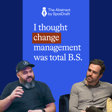
Ep 102: What Comes After Legal Ops? A Conversation with David Cowen
In this special live-recorded episode of The Abstract from CLOC in Las Vegas, host Tyler Finn sits down with David Cowen, founder of The Cowen Group and creator of the SOLID Summit Series.
David shares his journey from staffing to shaping the legal ops ecosystem, the moment he foresaw the rise of e-discovery, and why community is the most powerful response to chaos. He discusses the evolution of legal operations, the future of AI and agentic teams, and why trusting your talent matters more than ever. From frameworks on scaling legal to using ChatGPT as an executive coach, this episode offers a playbook for building a career and community in a rapidly changing industry.
Read detailed summary: https://www.spotdraft.com/podcast/episode-102
Topics:
Intro: 00:00
David's career journey: From staffing to community building: 2:22
The moment he discovered e-discovery's potential: 5:10
How TED Talks inspired the SOLID Summit format: 6:49
Chaos as the ideal condition for community building: 8:43
Overbuilding in legal tech: problem or opportunity?: 10:52
Spotting innovation through curiosity, not prediction: 13:02
Legal Ops turns 10: What’s next for the profession?: 17:33
Climbing the legal career “jungle gym,” not a ladder: 21:03
How to manage anxiety and disruption in an AI-driven future: 25:53
On coaching, preparation, and using ChatGPT as a partner: 28:25
Legal Ops’ evolving role in helping businesses scale: 32:49
The future of legal tech: use cases and AI agents: 37:12
The GC as catalyst: Top-down transformation is here: 39:46
Creators, Builders, Consumers: Who shapes the industry?: 42:54
What excites David most about the next 10 years: 45:35
Rapid-fire Questions: 47:25
Connect with us:
David Cowen – https://www.linkedin.com/in/davidcowen/
Tyler Finn - https://www.linkedin.com/in/tylerhfinn
SpotDraft - https://www.linkedin.com/company/spotdraft
SpotDraft is a leading contract lifecycle management platform that solves your end-to-end contract management issues.
Visit https://www.spotdraft.com to learn more.



















